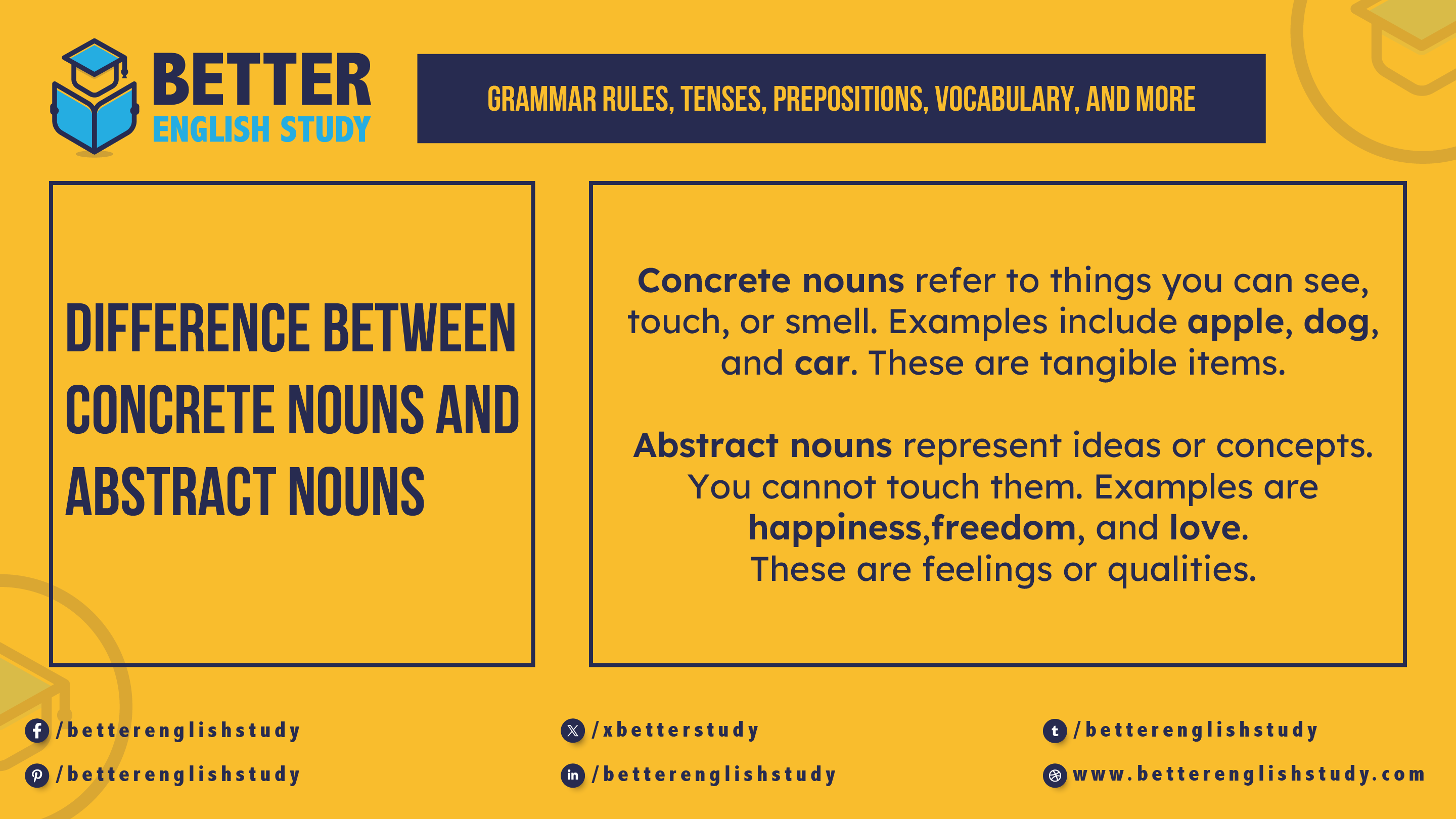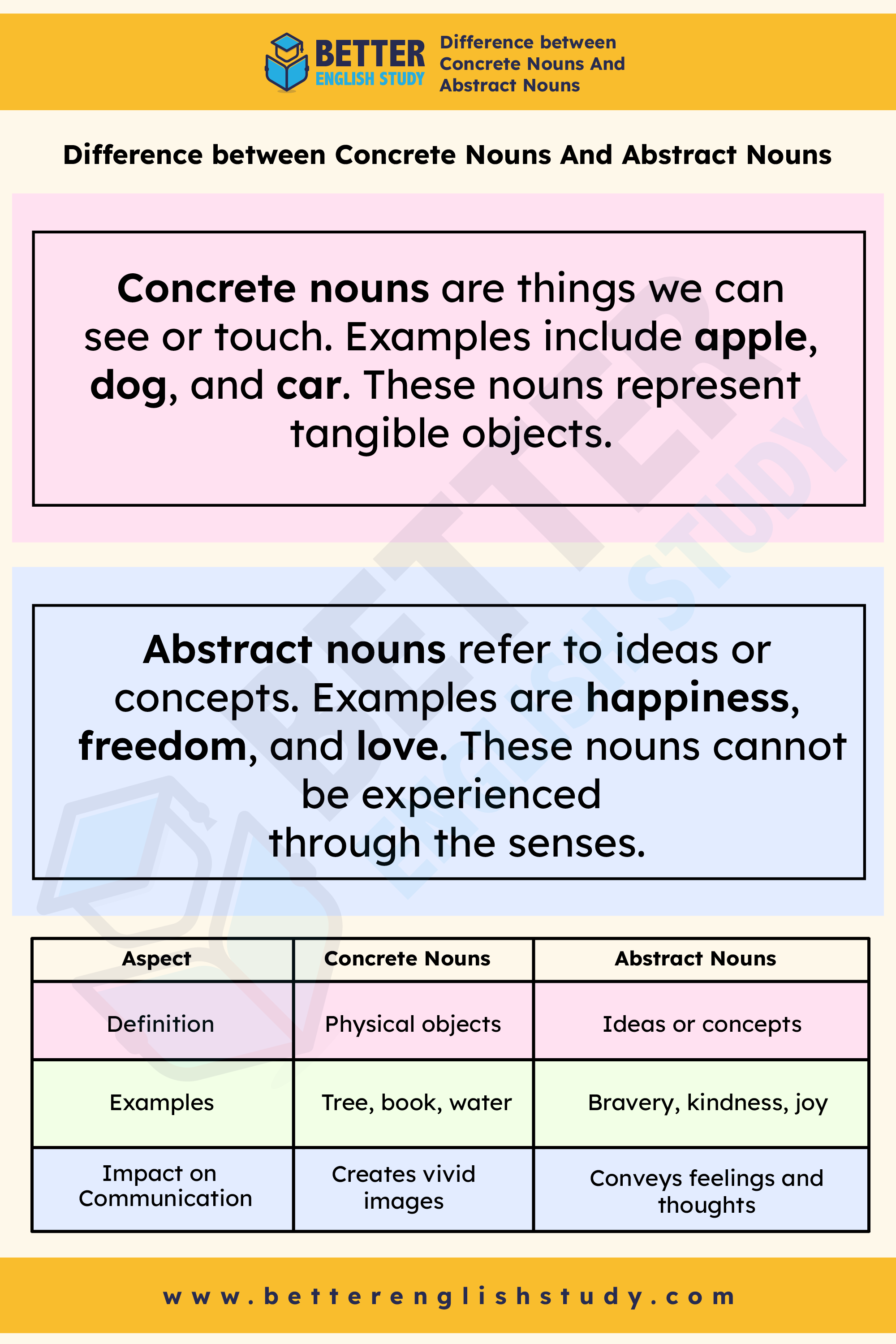
Concrete nouns refer to tangible objects that can be perceived through the senses, such as “apple” or “Air.” Abstract nouns represent ideas or qualities that cannot be physically touched, like “freedom” or “happiness.”
Understanding the difference between concrete and abstract nouns is essential for effective communication. Concrete nouns provide clarity by naming specific items we can see or touch, making them relatable. In contrast, abstract nouns convey emotions, concepts, and ideas, enriching our language with depth and meaning.
Both types of nouns play crucial roles in expressing thoughts and feelings. By mastering these distinctions, writers can enhance their skills and create more vivid and impactful content. This knowledge also aids in improving language comprehension for learners and enhances overall writing quality.
Concrete Vs. Abstract Nouns: A Primer
Nouns are important in language. They help us name things. Two main types of nouns exist: concrete and abstract.
Concrete nouns refer to things you can see, touch, or smell. Examples include Book, dog, and car. These are tangible items.
Abstract nouns represent ideas or concepts. You cannot touch them. Examples are Ambition, Loyalty, and love. These are feelings or qualities.
| Concrete Nouns | Abstract Nouns |
|---|---|
| Table | Friendship |
| Tree | Bravery |
| Ocean | Wisdom |

The Tangible World Of Concrete Nouns
Concrete nouns refer to things we can see, touch, or hear. These nouns represent real-world objects or substances. For example, the word “Ice cream” describes a physical item. Other examples include “Clock”, “Flower”, and “house”. Each of these can be experienced through our senses.
Characteristics of concrete nouns include:
- They are observable and can be perceived.
- They often exist in a specific location.
- They can be counted or measured.
Common examples in everyday language are:
| Concrete Noun | Example in a Sentence |
|---|---|
| Book | The book is on the table. |
| Tree | The tree provides shade. |
| Ball | The ball is red and round. |
Delving Into Abstract Nouns
Abstract nouns represent ideas or concepts that cannot be touched. They include feelings, qualities, and states. Examples are Beauty, Confidence, and Dedication. These nouns help express thoughts and emotions.
They are often found in literature and conversations. For instance, phrases like “the beauty of nature” or “the joy of learning” highlight abstract nouns.
Traits of abstract nouns include:
- They do not have a physical form.
- They cannot be perceived by the senses.
- They often describe emotional or intellectual experiences.
- They can be used in various contexts, like art, science, or daily life.
Common phrases with abstract nouns include:
| Phrase | Abstract Noun |
|---|---|
| She showed great courage. | Courage |
| He felt a sense of peace. | Peace |
| They expressed happiness on their faces. | Happiness |
Comparing Concrete And Abstract Nouns
Concrete nouns are things we can see or touch. Examples include Boat, Hand, and Cloud. These nouns represent tangible objects.
Abstract nouns refer to ideas or concepts. Examples are Dignity, Empathy, and Faith. These nouns cannot be experienced through the senses.
| Aspect | Concrete Nouns | Abstract Nouns |
|---|---|---|
| Definition | Physical objects | Ideas or concepts |
| Examples | Tree, book, water | Bravery, kindness, joy |
| Impact on Communication | Creates vivid images | Conveys feelings and thoughts |
Understanding these differences improves communication. Using the right nouns makes messages clearer.
Visualizing Abstract Vs. Concrete Nouns
Concrete nouns are things you can see, touch or feel. Examples include Internet, Pen, and Music. These nouns create a clear image in your mind. They represent physical objects we interact with daily.
Abstract nouns refer to ideas or feelings. Examples are Fear, Gratitude, and Honesty. These nouns are not visible, making them harder to imagine. They express emotions or concepts we often discuss.
Using mnemonic devices can help remember these differences. For concrete nouns, think of a solid object. For abstract nouns, think of a thought or feeling. This simple trick aids in learning.
Literary Utilization Of Nouns
Concrete nouns refer to things we can see, touch, or smell. Examples include Grass, Air, and Camera. These nouns create vivid images in our minds.
On the other hand, abstract nouns are ideas or concepts we cannot physically sense. Words like Justice, Innocence, and Patience fall into this category. They evoke feelings and thoughts.
In poetry, concrete nouns bring scenes to life. They help readers visualize moments. Abstract nouns deepen emotional connections. They invite reflection and interpretation.
Prose also uses both noun types. Concrete nouns provide clarity. Abstract nouns add depth and complexity. Writers blend these nouns to enhance storytelling.
Nouns In Language Evolution
Nouns have changed over time. Concrete nouns refer to things we can touch. Examples include Bridge, Foot, and River. Abstract nouns are different. They represent ideas or feelings. Examples are Trust, Success, and Wisdom.
Historically, nouns have played a key role in language. Early languages used many concrete nouns. As language evolved, abstract nouns became more common. They help express complex ideas.
Future trends may see a rise in abstract nouns. As societies change, so do our language needs. New concepts will likely emerge, creating more abstract nouns. This evolution reflects our growing understanding of the world.
Frequently Asked Questions
What Are Concrete Nouns?
Concrete nouns refer to physical objects that can be perceived through the senses. Examples include “Chair,” “Air,” and “Cloud. ” These nouns represent things that you can touch, see, smell, hear, or taste. In essence, they are tangible items found in the real world.
What Are Abstract Nouns?
Abstract nouns represent ideas, qualities, or conditions that cannot be physically touched. Examples include “Truth,” “Surprise,” and “Knowledge. ” These nouns embody concepts and feelings rather than physical objects. They often describe emotions or states of being that exist in our minds.
How Do Concrete And Abstract Nouns Differ?
The main difference lies in their nature. Concrete nouns are tangible and can be experienced through the senses. Conversely, abstract nouns are intangible and represent ideas or feelings. Understanding this distinction is crucial for effective communication and writing.
Can You Give Examples Of Both Noun Types?
Sure! Concrete nouns include “table,” “cat,” and “water. ” Abstract nouns include “love,” “fear,” and “wisdom. ” Using both types enhances language richness and expression. Recognizing examples helps clarify their usage in sentences and improves writing skills.
Conclusion
Understanding the difference between concrete and abstract nouns enhances your language skills. Concrete nouns refer to tangible objects, while abstract nouns express ideas and emotions. By recognizing these distinctions, you can improve your writing clarity. Use examples to deepen your understanding and make your communication more effective.
Keep practicing!
